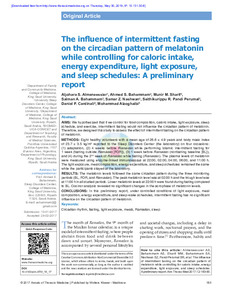Please use this identifier to cite or link to this item:
https://repositorio.uca.edu.ar/handle/123456789/1451| Título: | The influence of intermittent fasting on the circadian pattern of melatonin while controlling for caloric intake, energy expenditure, light exposure, and sleep schedules : a preliminary report | Autor: | Almeneessier, Aljohara S. BaHammam, Ahmed S. Sharif, Munir M. Bahammam, Salman A. Nashwan, Samar Z. Pandi Perumal, Seithikurippu R. Cardinali, Daniel Pedro Alzoghaibi, Mohammad |
Palabras clave: | MEDICINA; RITMO CIRCADIANO; AYUNO; LUZ; COMIDA; SUEÑO; INGESTION DE ALIMENTOS; CALORIAS; ACTIVIDAD FISICA | Fecha de publicación: | 2017 | Editorial: | Medknow | Cita: | Almeneessier A. S., et al. The influence of intermittent fasting on the circadian pattern of melatonin while controlling for caloric intake, energy expenditure, light exposure, and sleep schedules : a preliminary report [en línea]. Annals of Thoracic Medicine. 2017, 12 (3). doi:10.4103/atm.ATM_15_17. Disponible en: https://repositorio.uca.edu.ar/handle/123456789/1451 | Resumen: | Abstract: Aims: We hypothesized that if we control for food composition, caloric intake, light exposure, sleep schedule, and exercise, intermittent fasting would not influence the circadian pattern of melatonin. Therefore, we designed this study to assess the effect of intermittent fasting on the circadian pattern of melatonin. Methods: Eight healthy volunteers with a mean age of 26.6 ± 4.9 years and body mass index of 23.7 ± 3.5 kg/m2 reported to the Sleep Disorders Center (the laboratory) on four occasions: (1) adaptation, (2) 4 weeks before Ramadan while performing Islamic intermittent fasting for 1 week (fasting outside Ramadan [FOR]), (3) 1 week before Ramadan (nonfasting baseline [BL]), and (4) during the 2nd week of Ramadan while fasting (Ramadan). The plasma levels of melatonin were measured using enzyme-linked immunoassays at 22:00, 02:00, 04:00, 06:00, and 11:00 h. The light exposure, meal composition, energy expenditure, and sleep schedules remained the same while the participants stayed at the laboratory. Results: The melatonin levels followed the same circadian pattern during the three monitoring periods (BL, FOR, and Ramadan). The peak melatonin level was at 02:00 h and the trough level was at 11:00 h in all studied periods. Lower melatonin levels at 22:00 h were found during fasting compared to BL. Cosinor analysis revealed no significant changes in the acrophase of melatonin levels. Conclusions: In this preliminary report, under controlled conditions of light exposure, meal composition, energy expenditure, and sleep-wake schedules, intermittent fasting has no significant influence on the circadian pattern of melatonin. | URI: | https://repositorio.uca.edu.ar/handle/123456789/1451 | ISSN: | 1817-1737 | Disciplina: | MEDICINA | DOI: | 10.4103/atm.ATM_15_17 | Derechos: | Acceso Abierto | Fuente: | Annals of Thoracic Medicine, Vol. 12, N° 3, 2017 ISSN 1817-1737 |
| Appears in Collections: | Artículos |
Files in This Item:
| File | Description | Size | Format | |
|---|---|---|---|---|
| influence-intermittent-fasting-circadia.pdf | 737,29 kB | Adobe PDF |  View/Open |
Page view(s)
195
checked on Apr 30, 2024
Download(s)
285
checked on Apr 30, 2024
Google ScholarTM
Check
Altmetric
Altmetric
This item is licensed under a Creative Commons License

